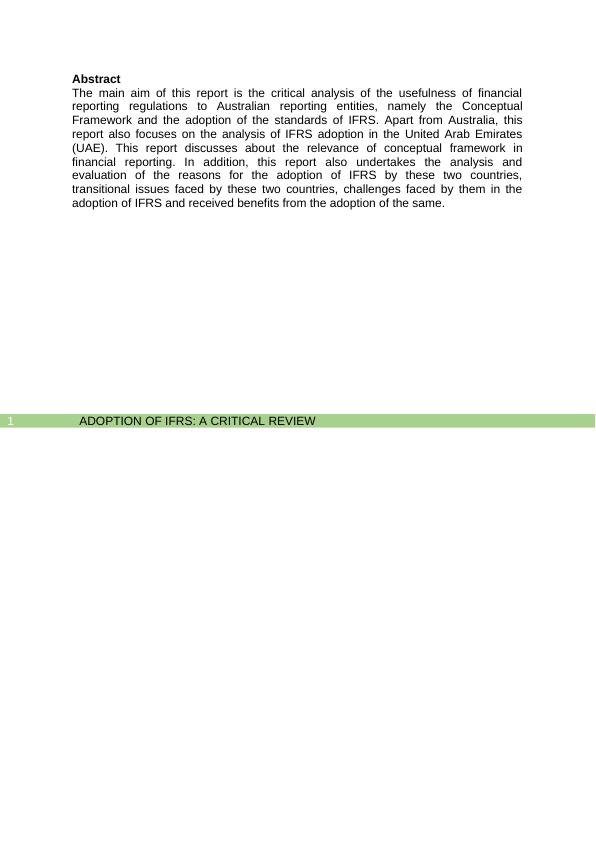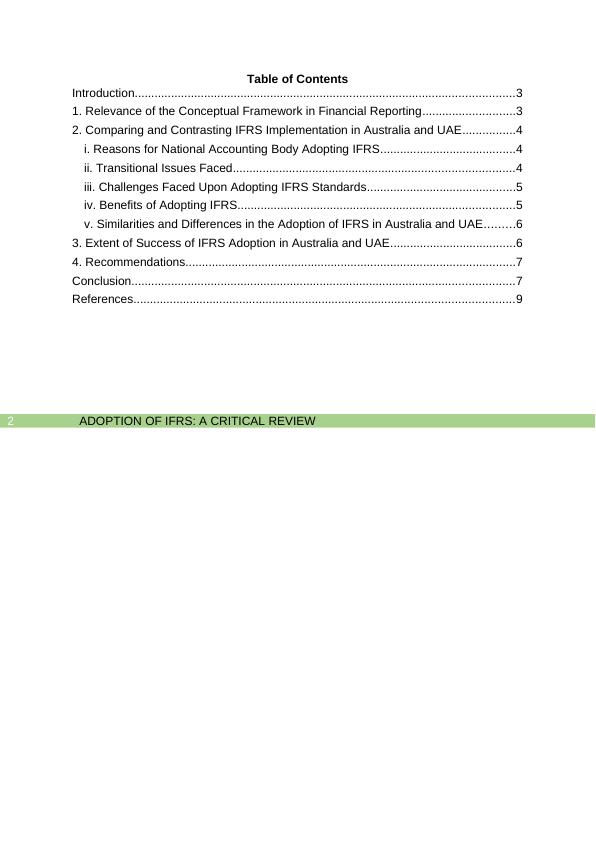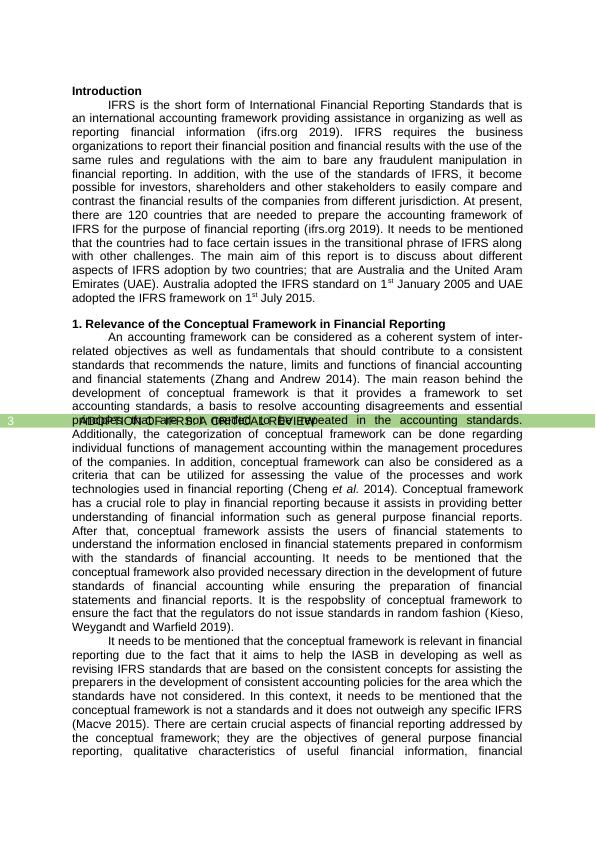Adoption of IFRS: A Critical Review
Added on 2022-12-19
11 Pages4371 Words1 Views
Running head: ADOPTION OF IFRS: A CRITICAL REVIEW
Adoption of IFRS: A Critical Review
Name of the Student
Name of the University
Author’s Note
Adoption of IFRS: A Critical Review
Name of the Student
Name of the University
Author’s Note

ADOPTION OF IFRS: A CRITICAL REVIEW1
Abstract
The main aim of this report is the critical analysis of the usefulness of financial
reporting regulations to Australian reporting entities, namely the Conceptual
Framework and the adoption of the standards of IFRS. Apart from Australia, this
report also focuses on the analysis of IFRS adoption in the United Arab Emirates
(UAE). This report discusses about the relevance of conceptual framework in
financial reporting. In addition, this report also undertakes the analysis and
evaluation of the reasons for the adoption of IFRS by these two countries,
transitional issues faced by these two countries, challenges faced by them in the
adoption of IFRS and received benefits from the adoption of the same.
Abstract
The main aim of this report is the critical analysis of the usefulness of financial
reporting regulations to Australian reporting entities, namely the Conceptual
Framework and the adoption of the standards of IFRS. Apart from Australia, this
report also focuses on the analysis of IFRS adoption in the United Arab Emirates
(UAE). This report discusses about the relevance of conceptual framework in
financial reporting. In addition, this report also undertakes the analysis and
evaluation of the reasons for the adoption of IFRS by these two countries,
transitional issues faced by these two countries, challenges faced by them in the
adoption of IFRS and received benefits from the adoption of the same.

ADOPTION OF IFRS: A CRITICAL REVIEW2
Table of Contents
Introduction...................................................................................................................3
1. Relevance of the Conceptual Framework in Financial Reporting............................3
2. Comparing and Contrasting IFRS Implementation in Australia and UAE................4
i. Reasons for National Accounting Body Adopting IFRS.........................................4
ii. Transitional Issues Faced.....................................................................................4
iii. Challenges Faced Upon Adopting IFRS Standards.............................................5
iv. Benefits of Adopting IFRS....................................................................................5
v. Similarities and Differences in the Adoption of IFRS in Australia and UAE.........6
3. Extent of Success of IFRS Adoption in Australia and UAE......................................6
4. Recommendations....................................................................................................7
Conclusion....................................................................................................................7
References...................................................................................................................9
Table of Contents
Introduction...................................................................................................................3
1. Relevance of the Conceptual Framework in Financial Reporting............................3
2. Comparing and Contrasting IFRS Implementation in Australia and UAE................4
i. Reasons for National Accounting Body Adopting IFRS.........................................4
ii. Transitional Issues Faced.....................................................................................4
iii. Challenges Faced Upon Adopting IFRS Standards.............................................5
iv. Benefits of Adopting IFRS....................................................................................5
v. Similarities and Differences in the Adoption of IFRS in Australia and UAE.........6
3. Extent of Success of IFRS Adoption in Australia and UAE......................................6
4. Recommendations....................................................................................................7
Conclusion....................................................................................................................7
References...................................................................................................................9

ADOPTION OF IFRS: A CRITICAL REVIEW3
Introduction
IFRS is the short form of International Financial Reporting Standards that is
an international accounting framework providing assistance in organizing as well as
reporting financial information (ifrs.org 2019). IFRS requires the business
organizations to report their financial position and financial results with the use of the
same rules and regulations with the aim to bare any fraudulent manipulation in
financial reporting. In addition, with the use of the standards of IFRS, it become
possible for investors, shareholders and other stakeholders to easily compare and
contrast the financial results of the companies from different jurisdiction. At present,
there are 120 countries that are needed to prepare the accounting framework of
IFRS for the purpose of financial reporting (ifrs.org 2019). It needs to be mentioned
that the countries had to face certain issues in the transitional phrase of IFRS along
with other challenges. The main aim of this report is to discuss about different
aspects of IFRS adoption by two countries; that are Australia and the United Aram
Emirates (UAE). Australia adopted the IFRS standard on 1st January 2005 and UAE
adopted the IFRS framework on 1st July 2015.
1. Relevance of the Conceptual Framework in Financial Reporting
An accounting framework can be considered as a coherent system of inter-
related objectives as well as fundamentals that should contribute to a consistent
standards that recommends the nature, limits and functions of financial accounting
and financial statements (Zhang and Andrew 2014). The main reason behind the
development of conceptual framework is that it provides a framework to set
accounting standards, a basis to resolve accounting disagreements and essential
principles that are not needed to be repeated in the accounting standards.
Additionally, the categorization of conceptual framework can be done regarding
individual functions of management accounting within the management procedures
of the companies. In addition, conceptual framework can also be considered as a
criteria that can be utilized for assessing the value of the processes and work
technologies used in financial reporting (Cheng et al. 2014). Conceptual framework
has a crucial role to play in financial reporting because it assists in providing better
understanding of financial information such as general purpose financial reports.
After that, conceptual framework assists the users of financial statements to
understand the information enclosed in financial statements prepared in conformism
with the standards of financial accounting. It needs to be mentioned that the
conceptual framework also provided necessary direction in the development of future
standards of financial accounting while ensuring the preparation of financial
statements and financial reports. It is the respobslity of conceptual framework to
ensure the fact that the regulators do not issue standards in random fashion ( Kieso,
Weygandt and Warfield 2019).
It needs to be mentioned that the conceptual framework is relevant in financial
reporting due to the fact that it aims to help the IASB in developing as well as
revising IFRS standards that are based on the consistent concepts for assisting the
preparers in the development of consistent accounting policies for the area which the
standards have not considered. In this context, it needs to be mentioned that the
conceptual framework is not a standards and it does not outweigh any specific IFRS
(Macve 2015). There are certain crucial aspects of financial reporting addressed by
the conceptual framework; they are the objectives of general purpose financial
reporting, qualitative characteristics of useful financial information, financial
Introduction
IFRS is the short form of International Financial Reporting Standards that is
an international accounting framework providing assistance in organizing as well as
reporting financial information (ifrs.org 2019). IFRS requires the business
organizations to report their financial position and financial results with the use of the
same rules and regulations with the aim to bare any fraudulent manipulation in
financial reporting. In addition, with the use of the standards of IFRS, it become
possible for investors, shareholders and other stakeholders to easily compare and
contrast the financial results of the companies from different jurisdiction. At present,
there are 120 countries that are needed to prepare the accounting framework of
IFRS for the purpose of financial reporting (ifrs.org 2019). It needs to be mentioned
that the countries had to face certain issues in the transitional phrase of IFRS along
with other challenges. The main aim of this report is to discuss about different
aspects of IFRS adoption by two countries; that are Australia and the United Aram
Emirates (UAE). Australia adopted the IFRS standard on 1st January 2005 and UAE
adopted the IFRS framework on 1st July 2015.
1. Relevance of the Conceptual Framework in Financial Reporting
An accounting framework can be considered as a coherent system of inter-
related objectives as well as fundamentals that should contribute to a consistent
standards that recommends the nature, limits and functions of financial accounting
and financial statements (Zhang and Andrew 2014). The main reason behind the
development of conceptual framework is that it provides a framework to set
accounting standards, a basis to resolve accounting disagreements and essential
principles that are not needed to be repeated in the accounting standards.
Additionally, the categorization of conceptual framework can be done regarding
individual functions of management accounting within the management procedures
of the companies. In addition, conceptual framework can also be considered as a
criteria that can be utilized for assessing the value of the processes and work
technologies used in financial reporting (Cheng et al. 2014). Conceptual framework
has a crucial role to play in financial reporting because it assists in providing better
understanding of financial information such as general purpose financial reports.
After that, conceptual framework assists the users of financial statements to
understand the information enclosed in financial statements prepared in conformism
with the standards of financial accounting. It needs to be mentioned that the
conceptual framework also provided necessary direction in the development of future
standards of financial accounting while ensuring the preparation of financial
statements and financial reports. It is the respobslity of conceptual framework to
ensure the fact that the regulators do not issue standards in random fashion ( Kieso,
Weygandt and Warfield 2019).
It needs to be mentioned that the conceptual framework is relevant in financial
reporting due to the fact that it aims to help the IASB in developing as well as
revising IFRS standards that are based on the consistent concepts for assisting the
preparers in the development of consistent accounting policies for the area which the
standards have not considered. In this context, it needs to be mentioned that the
conceptual framework is not a standards and it does not outweigh any specific IFRS
(Macve 2015). There are certain crucial aspects of financial reporting addressed by
the conceptual framework; they are the objectives of general purpose financial
reporting, qualitative characteristics of useful financial information, financial

End of preview
Want to access all the pages? Upload your documents or become a member.
Related Documents
Accounting Theory and Current Issueslg...
|12
|3126
|228
Adoption of IFRS and Relevance of Conceptual Framework of Financial Reportinglg...
|17
|3684
|427
Accounting Theories and Current Issueslg...
|18
|4645
|92
Adoption of IFRS: A critical reviewlg...
|9
|3563
|380
Accounting Theory and Contemporary Issuelg...
|10
|3787
|26
Accounting Theory Contemporary Issueslg...
|4
|405
|14
